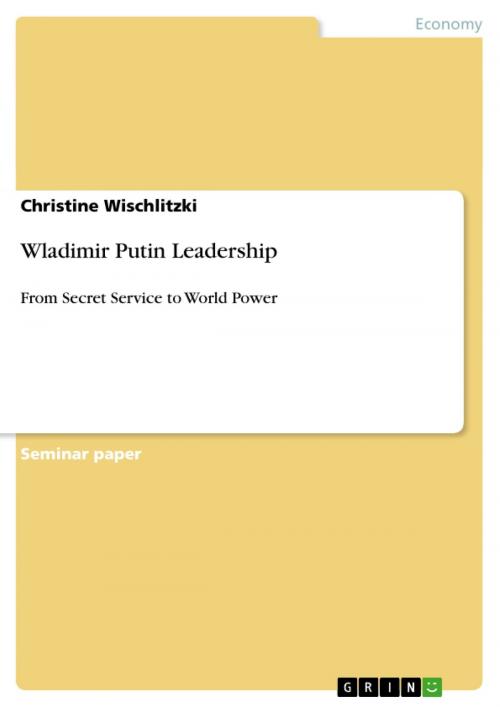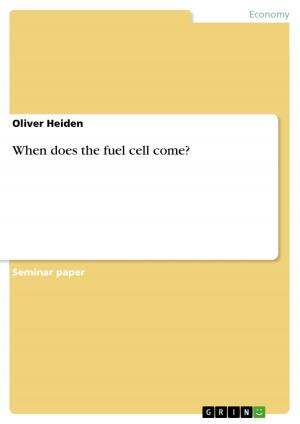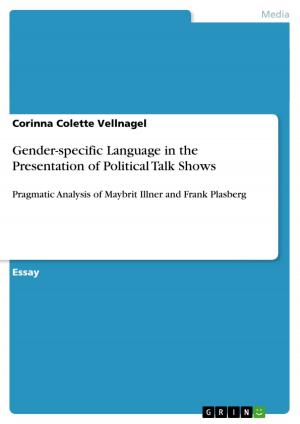| Author: | Christine Wischlitzki | ISBN: | 9783638046916 |
| Publisher: | GRIN Publishing | Publication: | May 13, 2008 |
| Imprint: | GRIN Publishing | Language: | English |
| Author: | Christine Wischlitzki |
| ISBN: | 9783638046916 |
| Publisher: | GRIN Publishing |
| Publication: | May 13, 2008 |
| Imprint: | GRIN Publishing |
| Language: | English |
Seminar paper from the year 2008 in the subject Business economics - General, grade: 1,6, Heilbronn Business School (Heilbronn Business School), course: MBA, 18 entries in the bibliography, language: English, abstract: This assignment started in November 2007 and ended in February 2008. Due to the topic of this assignment and the huge possibilities embedded within, I found it quite challenging at the beginning to find an appropriate example of a leader. In the end I decided to write this case about someone, who is well known, controversially discussed and not only a person but also a personality - Vladimir Putin. A man who is not certain where to look about, rather shy, on the right hand side of this 187 cm giant Boris Jelzin. Vladimir Putin's posture is hesitant and observant. This picture was taken 9 years ago in 1999. In this assignment we will learn who he was, who he became and who he is and what impact he had on his country - Russia. The key data for Russia are amazing. One can conclude from the size (17.075.400 square kilometres with 142.400.000 inhabitants with eleven time zones) of the country, the billionaires and the poor, the history and power of this state, that a lot can be achieved - for the good or for the worse. If we have a short look at the recent political history of Russia before Putin was elected president, we are faced with Boris Jelzin. A great man in size, but weak in politics. The cultural history which emerged throughout the last decades is assertiveness - almost aggressiveness - an effective way to work oneself up the social ladder. Another trade is the in-group collectivism and gender egalitarianism. (page 310, Leadership - Theory and Practice, Peter G. Northouse, SAGE). Especially the trait of in-group collectivism will be a necessary stepping-stone for Putin's career. Putin's well-calculated steps, from the beginning of his political career to the peak of his carrer is described and shows who is pulling the strings behind the political stage of Russia. His leadership style is analysed against various leadership theories. The recent events (May 2008) support the trend which is analysed in this case.
Seminar paper from the year 2008 in the subject Business economics - General, grade: 1,6, Heilbronn Business School (Heilbronn Business School), course: MBA, 18 entries in the bibliography, language: English, abstract: This assignment started in November 2007 and ended in February 2008. Due to the topic of this assignment and the huge possibilities embedded within, I found it quite challenging at the beginning to find an appropriate example of a leader. In the end I decided to write this case about someone, who is well known, controversially discussed and not only a person but also a personality - Vladimir Putin. A man who is not certain where to look about, rather shy, on the right hand side of this 187 cm giant Boris Jelzin. Vladimir Putin's posture is hesitant and observant. This picture was taken 9 years ago in 1999. In this assignment we will learn who he was, who he became and who he is and what impact he had on his country - Russia. The key data for Russia are amazing. One can conclude from the size (17.075.400 square kilometres with 142.400.000 inhabitants with eleven time zones) of the country, the billionaires and the poor, the history and power of this state, that a lot can be achieved - for the good or for the worse. If we have a short look at the recent political history of Russia before Putin was elected president, we are faced with Boris Jelzin. A great man in size, but weak in politics. The cultural history which emerged throughout the last decades is assertiveness - almost aggressiveness - an effective way to work oneself up the social ladder. Another trade is the in-group collectivism and gender egalitarianism. (page 310, Leadership - Theory and Practice, Peter G. Northouse, SAGE). Especially the trait of in-group collectivism will be a necessary stepping-stone for Putin's career. Putin's well-calculated steps, from the beginning of his political career to the peak of his carrer is described and shows who is pulling the strings behind the political stage of Russia. His leadership style is analysed against various leadership theories. The recent events (May 2008) support the trend which is analysed in this case.















